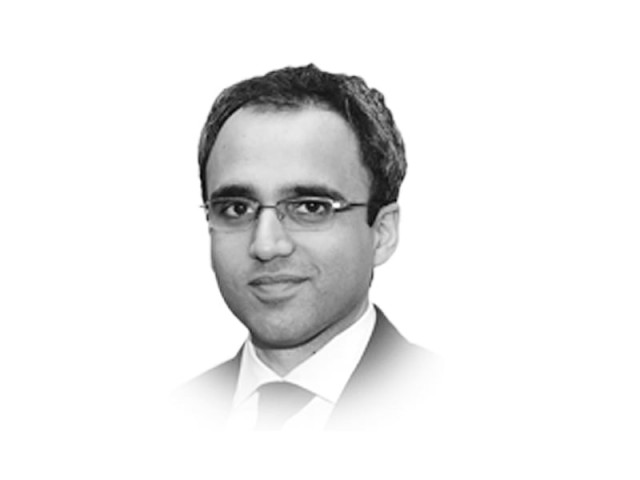Name-calling and the politics of class
For the most part, parties themselves continue to be dominated by propertied classes, with powerful local politicians.

The writer is Assistant Professor of Political Science
at LUMS
It is important to remember that all votes are equal regardless of whether they are cast by a member of the urban elite, or by a landless wageworker in the countryside. People have different experiences and interests, all of which go into shaping individual electoral choices. Elections serve to aggregate these individual choices, channeling them through the party system to ensure the formation of a government that is as representative as possible. In theory at least, voters occupy a pluralistic space in which different interests compete with one another on a level playing field. By that logic, there is little to distinguish “burgers” from their less privileged counterparts; all citizens have a right to have their voices heard, and to participate in the electoral process.
Put in this perspective, it is undeniably the case that terms like “burger”, which seek to belittle the political involvement of the urban elite, are unhelpful and should be avoided. However, to respond to this name-calling by blaming the opposition for being uneducated or ignorant is to perpetuate the exact same fallacy. When sections of the urban elite start to blame the electorate for the PTI’s loss, attributing the PML-N’s victory to rural voters who simply do not know better, or to urban traders who simply do not want change, they essentially question the right of those sections of the populace to express their own political preferences. One might argue that education and wealth lead to better informed voters, but that would be an incredibly presumptuous argument to make; you do not need a college education to know if you need roads, schools, and health care, and it is far from clear that the educated, urban elite have always made progressive political choices. After all, they were one of the main sources of support for the Musharraf dictatorship in its early years.
One of the problems here is the excessive emphasis the electoral process places on individual choice; change is believed to be guaranteed through the simple act of making a decision and casting vote. However, the reality is that the act of voting does not entitle any voter to a result of their choosing; compromise is an intrinsic and unavoidable part of the democratic process.
The emphasis placed on individual choice also obscures, to an extent, the role that broader social formations like class play in the electoral arena. After all, despite the democratic emphasis on pluralism, the fact remains that some voices are louder than others, and not all interests are equal. Amidst all the insults and accusations being traded by partisans on different sides of the political divide, the real irony lies in the fact that the PML-N and the PTI, as well as the other mainstream parties, all remain bastions of privilege, elite interest and, increasingly, middle class aspiration. For the most part, the parties themselves continue to be dominated by the propertied classes, with powerful local politicians garnering political support by dispensing patronage to captive constituents lacking alternative means through which to acquire public goods and services from the state. In the realm of policy, there is a clear consensus about the need for free market economic reform, with emphasis placed on the need to create an environment more conducive to the pursuit of profit. Those without businesses to run, capital to invest, or skills to exploit, are to be left to the tender mercies of the market, awaiting the fruits, if any, of trickle-down growth. In this entire discourse, the interests of the subordinate classes remain marginal to the concerns of mainstream politics. Roti, kapra, and makaan have been replaced by bullet trains, metro buses and drones.
At the time if its formation in the late 1960s, the PPP articulated a political vision that promised a radical transformation of the Pakistani society. Drawing on the language and symbolism of socialism, riding a wave of anti-Ayub Khan sentiment and explicitly identifying itself with the working classes of Pakistan, the PPP positioned itself as a party committed to smashing the traditional political, social and economic order. Despite its clearly mixed record once in government, the party at least came to represent, if only symbolically, a progressive alternative to the status quo. The elections of 1970 were significant not just because they were the first to feature universal adult suffrage, but also because they were characterised by a clear differentiation between the Right and the Left, the Old and the New.
The same cannot be said of 2013. Class is a category that cuts across the urban and the rural, the educated and the illiterate, with property ownership and income continuing to differentiate between the politically dominant minority whose interests are represented by the mainstream parties, and the subordinate majority. The lack of ideological difference between the major parties in 2013, at least on issues of economic justice and redistribution, poses important questions about the quality of our democracy in terms of its representative character. It also means that, in the grander scheme of things, the “burgers” and their counterparts facing off in Lahore can rest assured that whatever the outcome of their protests, the interests of the elite are unlikely to be endangered.
Published in The Express Tribune, May 18th, 2013.















COMMENTS
Comments are moderated and generally will be posted if they are on-topic and not abusive.
For more information, please see our Comments FAQ